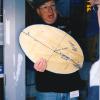Log, Dec 14, 2001
5 people. The weather was against us once again. However we did put on our class at 8 PM. After describing the chain of events attendent with 1987SNA - the first naked eye supernova since 1604 we had moved on toward nucleosysnthesis. We were presented with a dramatic example of the cessation of one form of useful energy about 9:40 when the lights went out and stayed out. Using a flashlight and the glow from my laptop we continued. However the lack of light was scarcely a boon because the skies outside were opaque.We hope some of you managed to get a glimpse of the Geminid meteors this morning. While we didn't have a session at FDO in spite of an announcement that we would posted by a major internet provided, several of us had plans to take a gander at them. In Westerly, the fog was jsut beginning to form but "Pasture and Cowlicks" (see Leonids for how these silly names came about), and Jupiter were almost over head at 3 to 4 this morning. By 4:15 the fog was too thick to see anything by Jupiter. Usually in a meteor shower you see many tiny flicks and a few bright streaks. With the damp conditions, only the bright streaks were visible. I'd estimate it it at about 3-5% of the rate we saw back with the Leonids. Most of the Geminids were near the radiant, but this might be a byproducr of that area being the only really clear part of the sky. None of the meteors deserved to be called fireballs.Barry wrote: " I wasn't sure of the time peak time for this meteor shower, I think it was sometime early in the morning. Here in Rhode Island it was raining and cloudy when I went to bed so I never even thought about sticking my head out the door to check the sky. I did wake up at 4:15 am, and by 4:35 am I was outside standing in the fog, barefooted with a tee-shirt on peering at the morning sky that was almost cloudless in the South and South West. The Big Dipper was almost straight overhead (that was a big surprise) and Jupiter was the brightest object in the sky. Between 4:35 and 5:05am I counted 12 Geminids and one sporadic that seemed to come out of Cancer. It raced across an almost black sky before it disappeared just before it reached Jupiter. (maybe it was a left over from last months Leonids). Only one of these meteors came close to being a bright "fireball" and all of them had very little color, most likely their light intensity was being block by the clouds and fog that was still hanging around. The one sporadic was traveling at an amazing rate of speed, leaving an impression in the morning sky that looked like a thin white scratch streaking its way westward. It was so fast it made me wonder if I really saw it at all, and it was by far traveling faster than any of the Geminids that I observed. By 5:05 I could feel every pebble and blade of grass under my bare feet so I decided to go in and get the last of my morning Z's. This was not the Leonids of 2001 but it was worth the few minutes of peace under the stars."Returning home, I encountered a manifestation of the "glory". If you haven't seen the glory it can be quite startling to see. A glory is a shadow cast by a bright light against heavy fog. What makes it ususual is the the edge of the shadow is ringed by a bright halo caused by two effects of interest to opticians and astronomers, diffraction and total internal reflection. Some people report seeing the glory's halo as a rainbow when the source of the light is the Sun. However conditions have to be just right for this to happen. The area where your shadow falls must be protected from light in any direction except behind you. Also the fog must be just dense enough for the effect without being so dense that the Sun's glare destroys the rainbow hues.At sunset tonight we just managed to miss seeing the start of a solar eclipse by less than 3 minutes. In fact, the top of the Sun was still above the horizon when the Moon began to take a nibble out of the bottom. However, this eclipse which can be seen best in the Pacific is not total but annular.We also missed a bright extremely fast moving near Earth asteroid 1998 WT24 which whizzed past Earth this evening. With a comet also in the sky we would have had some interesting objects on a clear moonless night.-Les Coleman
- Author:
- Leslie Coleman
- Entry Date:
- Dec 14, 2001
- Published Under:
- Leslie Coleman's Log

